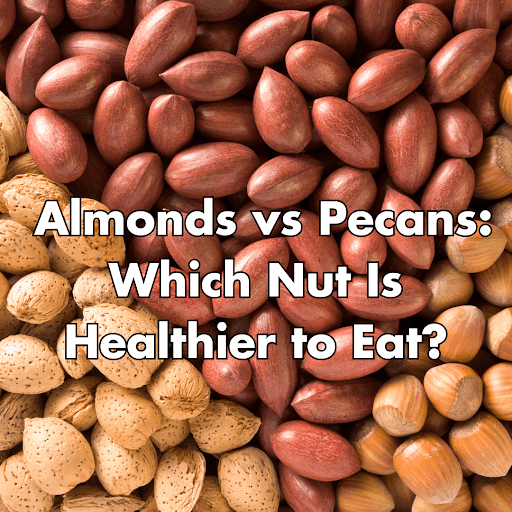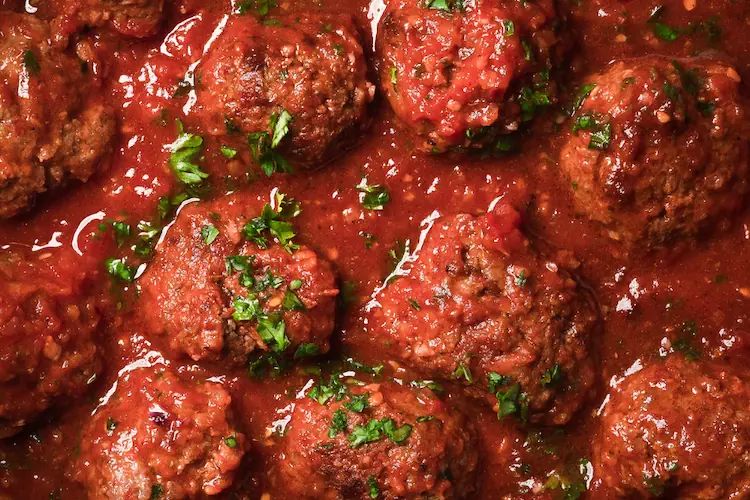As a self-proclaimed healthy foodie who loves snacking, I’m always on the lookout for nutritious and delicious options.
And let’s be honest, who doesn’t love a good handful of nuts?
They’re packed with flavor and offer a ton of health benefits.
But with so many kinds of nuts out there, it can be hard to choose.
In today’s post, I’ll compare the health benefits of almonds and pecans.
Which type of nut is healthier? Let’s find out together!
Almonds vs. Pecans: A Head-to-Head Comparison
Both almonds and pecans are nutritious snacks and nutritional powerhouses.
The two offer a similar nutritional profile. They’re both considered tree nuts (not true botanical nuts), and are an important part of a balanced daily diet.
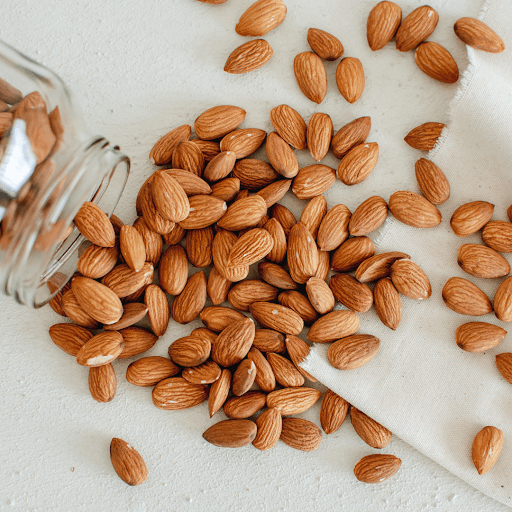
Let’s break down some key nutrition information:
Healthy Fats: Both nuts are rich in healthy fats, primarily monounsaturated fats, which are known for their heart-health benefits.
These unsaturated fatty acids play a significant role in lowering LDL cholesterol (the “bad” cholesterol) and improving overall cholesterol levels. They’re also great for keeping you full.
Dietary Fiber: Both almonds and pecans offer a good source of dietary fiber, which aids digestion and promotes feelings of fullness. This can potentially contribute to weight loss or body weight management. Fiber is also crucial for maintaining healthy blood sugar levels.
Vitamins and Minerals:
- Vitamin E: Both nuts are excellent sources of vitamin E, a fat-soluble vitamin and antioxidant that supports skin health and immune system function. Vitamin E also helps protect cells from damage caused by free radicals.
- Vitamin B: Both contain various B vitamins, important for energy production and brain health. These vitamins play a role in everything from cell metabolism to nerve function.
Similar Amounts of Fats: They have similar amounts of fats, although the specific fatty acid profiles vary slightly. It’s worth noting that the fat in both nuts is primarily the healthy kind.
Other Nutrients: Both contain other beneficial nutrients, including magnesium, potassium, and antioxidants. These contribute to overall well-being and play a role in various bodily functions.
Don’t underestimate the power of these little nutritional nuggets! Magnesium, for example, is essential for muscle and nerve function, blood sugar control, and blood pressure regulation. We love magnesium!
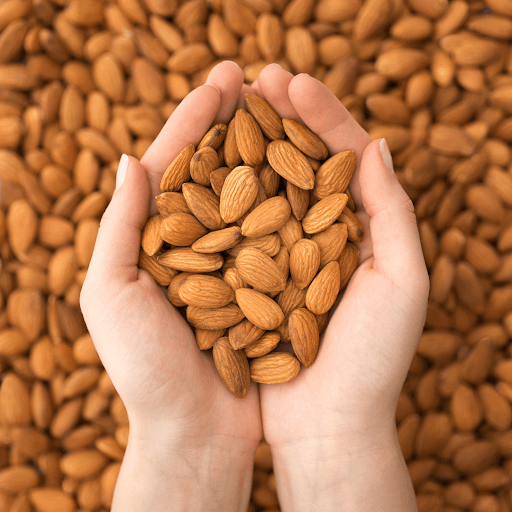
Almonds
I love the crunch of almonds! They’re readily available in most grocery stores and are such a good on-the-go snack.
Facts about Almonds:
- Almond Tree: Almonds grow on the almond tree, primarily in California in the United States. They are enjoyed as whole kernels, raw nuts, roasted nuts, almond milk, and almond flour.
- Health Benefits: Almonds have been linked to various health benefits, including improved blood sugar levels (making them a good choice for people with or at risk of risk of diabetes), reduced cardiovascular risk factors, and potentially lower blood pressure. Some studies also suggest that almonds may play a role in gut health. Wow!
- Culinary Uses: Almonds are used in both sweet and savory dishes. Think almond butter, roasted almonds, or even almond-crusted chicken, one of my favorite weeknight dinners.
Pecans
Pecans, with their rich, buttery flavor, are another favorite of mine. I typically enjoy them in pies and other baked goods, but they’re just as good on their own.
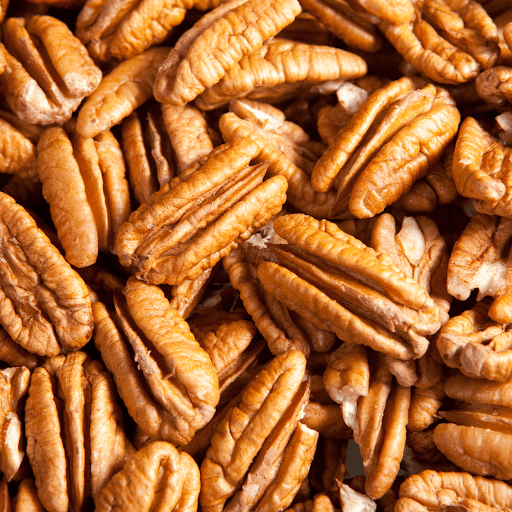
Facts about Pecans
- Pecan Trees: Pecan trees are native to North America. Pecan halves are a popular snack.
- Health Benefits: Research suggests that pecans may also contribute to heart health by improving blood lipids and reducing oxidative stress. Studies, like a 12-week study or research on pecan-enriched diets, have shown significant reductions in total cholesterol and LDL cholesterol with pecan consumption. Pecans are also a good source of antioxidants, which help protect your body from damage.
- Culinary Uses: Pecans are fantastic in pies, pralines, and can add a nutty depth to salads and other dishes. They are also used to make pecan oil.
So, Which Nut is Healthier?
Honestly, both almonds and pecans are incredibly healthy snacks and deserve to be part of your daily diet. There isn’t a clear “winner” when comparing these delicious nuts.
The right choice depends on your individual preferences and dietary needs. Both offer a variety of health benefits and are considered among the best nuts and healthiest types of nuts you can eat.
Other Nuts to Consider
While we’re on the topic of nuts, I want to give a shoutout to some other versatile nuts that are also packed with nutrients:
- Walnuts: Known for their brain health benefits, thanks to their omega-3 fatty acid content.
- Macadamia Nuts: While higher in fat, they’re still a good source of monounsaturated fats.
- Brazil Nuts: A great source of selenium.
- Pine Nuts: Delicious in pesto and other dishes.
- Cashews: These are a good source of protein and minerals like magnesium and zinc. They have a creamy texture and a mild flavor.
- Hazelnuts: Hazelnuts are often used in desserts and chocolate spreads. They are a good source of vitamin E, manganese, and copper.
- Pistachios: These are packed with antioxidants and are a good source of potassium and fiber. They’re delicious on their own as a snack or added to salads and desserts.
- Peanuts: While technically legumes, peanuts are often grouped with nuts due to their similar nutritional profile and culinary uses. They are an excellent source of protein and contain healthy fats and fiber.
And let’s not forget about seeds! Pumpkin seeds and sunflower seeds are also incredibly nutritious food and make for excellent healthy snacks.

Frequently Asked Questions (FAQs)
Q: What about roasted nuts vs. raw nuts?
A: Raw nuts generally retain more nutrients, but roasted nuts can still be a healthy option. Just be mindful of added salt and oil.
Q: What’s a serving size of nuts?
A: A single serving is generally about an ounce of nuts, which is a handful.
Q: Are nuts good for weight loss?
A: Yes! Despite their high fat content, the fiber and protein in nuts can help you feel full, potentially aiding in weight loss or preventing weight gain. However, be mindful of extra calories.
Q: What about nut allergies?
A: Having a nut allergy is a serious concern. If you have a nut allergy, avoid all tree nuts and peanuts (which are legumes).
Q: What about sodium intake?
A: Be mindful of sodium intake when choosing nuts, as some varieties can be high in salt. Opt for unsalted or lightly salted options.
Q: What is the shelf life of nuts?
A: Nuts have a decent shelf life, but it is still important to store them properly so that they don’t go rancid too quickly.
Whether you’re team almond or team pecan (or both, like me!), adding these delicious nuts into your diet is an easy way to boost your health. They’re a great source of healthy fats, dietary fiber, vitamins, and minerals.
Enjoy your ounce of nuts!

